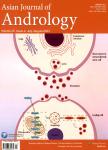The isolation and identification of apolipoprotein C-I in hormone-refractory prostate cancer using surface-enhanced laser desorption/ionization time-of-flight mass spectrometry
The isolation and identification of apolipoprotein C-I in hormone-refractory prostate cancer using surface-enhanced laser desorption/ionization time-of-flight mass spectrometry作者机构:Department of Urology Graduate School of Medicine Chiba University Chiba 260-8670 Japan Department of Molecular Diagnosis Graduate School of Medicine Chiba University Chiba 260-8670 Japan
出 版 物:《Asian Journal of Andrology》 (亚洲男性学杂志(英文版))
年 卷 期:2009年第11卷第3期
页 面:299-307页
核心收录:
学科分类:1002[医学-临床医学] 100214[医学-肿瘤学] 10[医学]
基 金:Ministry of Education, Science, Technology and Culture,Japan Ministry of Health, Labour and Welfare, Japan (Aid for Cancer Research) Public Trust Haraguchi Memorial Cancer Research Fund Grants-in-Aid from the Yamaguchi Endocrine Research Association Japanese Foundation for Prostate Cancer Japanese Urological Association
主 题:apolipoprotein C-I hormonal therapy prognosis prostate cancer surface-enhanced laser desorption/ionization time-offlight mass spectrometry
摘 要:Androgens play a central role in prostate cancer pathogenesis, and hence most of the patients respond to androgen deprivation therapies. However, patients tend to relapse with aggressive prostate cancer, which has been termed as hormone refractory. To identify the proteins that mediate progression to the hormone-refractory state, we used protein-chip technology for mass profiling of patients' sera. This study included 16 patients with metastatic hormone-refractory prostate cancer who were initially treated with androgen deprivation therapy. Serum samples were collected from each patient at five time points: point A, pre-treatment; point B, at the nadir of the prostate- specific antigen (PSA) level; point C, PSA failure; point D, the early hormone-refractory phase; and point E, the late hormone-refractory phase. Using surface-enhanced laser desorption/ionization time-of-flight mass spectrometry, we performed protein mass profiling of the patients' sera and identified a 6 640-Da peak that increased with disease progression. Target proteins were partially purified, and by amino acid sequencing the peak was identified as a fragment of apolipoprotein C-I (ApoC-I). Serum ApoC-I protein levels increased with disease progression. On immunohistochemical analysis, the ApoC-i protein was found localized to the cytoplasm of the hormone-refractory cancer cells. In this study, we showed an increase in serum ApoC-I protein levels in prostate cancer patients during their progression to the hormone-refractory state, which suggests that ApoC-I protein is related to progression of prostate cancer. However, as the exact role of ApoC-I in prostate cancer pathogenesis is unclear, further research is required.



